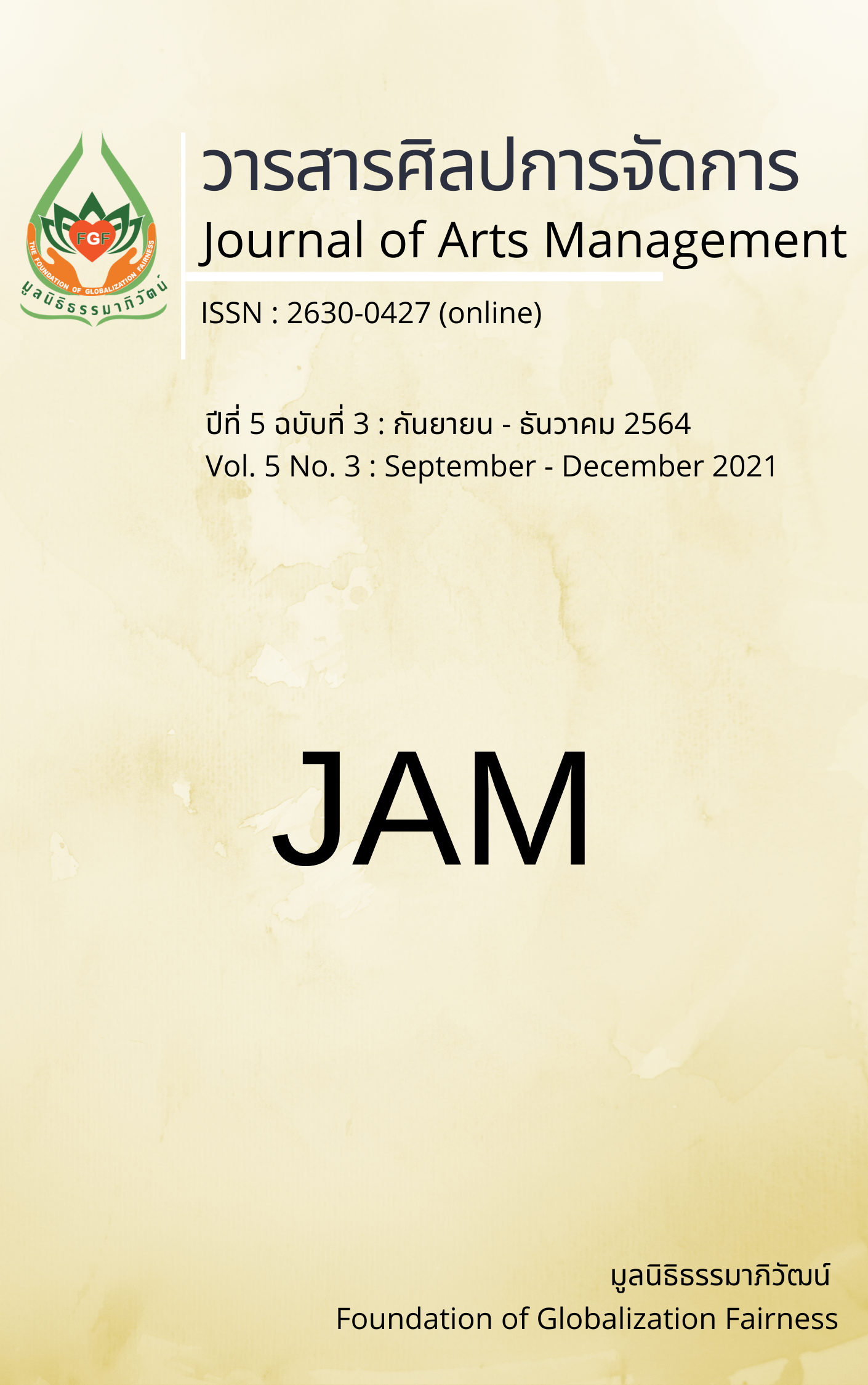Wetland in Urban Area: Way of Life, People, Mythical, Marginalized and Negotiation Practices
Main Article Content
Abstract
This article aimed to study (1) the way of life of people in urban areas and the use of wetlands (2) the myths discourse of creating marginalization of urban wetlands (3) community bargaining practices on myths about urban wetlands. This research is a qualitative research, collected data by using an interview form, survey and focus group discussion form. The research results were found as follows;
1. The ecosystem of this wetland It can be regarded as the base of important resources for the livelihood of the people in the area and the existence of the community. Because it is an ecosystem called Pa Bung Pa Tam forest ecosystem which is important to the way of life of the people in the community especially those who rely mainly on resources in the Pa Bung Pa Tam forest for their livelihood.
2. This wetland is not in the state’s document system. This has led to a myth that creates a discourse of marginalization for people and this area. Whether it's creating the myth that this wetland is a floodplain creating the myth that communities living in wetlands are the main cause of flooding in Ubon Ratchathani, creating the myth that this wetland is an area without a clear entitlement system, so it can allow free access including creating the myth that urban wetlands have less biodiversity.
3. Some villagers have tried to negotiate a variety of discourses that marginalize them. This is to redefine the group's meaning and create new values for themselves and this wetland.
Article Details
Views and opinions appearing in articles in the Journal of Arts of Management It is the responsibility of the author of the article. and does not constitute the view and responsibility of the editorial team I agree that the article is copyright of the Arts and Management Journal.
References
Chinnak, K., & Chinnak, S. (2011). Wetlands: Sociological and anthropological perspectives. Ubon Ratchathani Printing House.
Chinnak, S. (2012). The mythical discourse produced of wetland in urban areas and the marginalized and negotiation practices of indigenous knowledge systems. paper presented at the academic seminars “local wisdom for isan development #1”, February 17, 2012, at the Faculty of Liberal Arts, Ubon Ratchathani University.
Chinnak, S., & Tai Baan Researcher. (2005). Ways of life, people, and wetlands: The dynamics of resource management in oxbow lake ecosystem of urban communities in the urban area of Ubon Ratchathani Municipality and Warin Chamrap Municipality, Ubon Ratchathani Province. A Final Research Report Propose to the Thailand Research Fund (TRF).
Dhamwicha, S. (2008). Interview. August, 27.
Foundation for Ecological Recovery. (2003). Before the actual shooting: Mega-project in water diversion Project; Kok, Ing, Nan. Nopburi Printing.
Ganjanapan, A. (2000). “Rights”. In the department of sociology and anthropology. Basic concepts of society and culture. Faculty of Social Sciences, Chiang Mai University.
Ganjanapan, A. (2001). Community dimension: Local thinking about rights, power and resource management. Thailand Research Fund (TRF).
Hankun, K, Manorom, K, & Kittivetchakul, N. (2013). Power negotiating fields of an urban poor community in Ubon Ratchathani province. Journal of Liberal Arts, Ubon Ratchathani University, 9(1), 43-73.
Kunurat, P. et al. (1993). A study of environment and utilization of pa bung pa tam forest in the central Mun River area. Research report submitted to the Canadian international affairs administration (CIDA) Research and Development Institute, Khon Kaen University.
Matichon. (2020, January 31). Wetland City for Sustainable Development. pp. 7.
Nammai, T., & Ratri, P. (2008). Draft report on the results of knowledge synthesis. “Pa Bung Pa Tam”, Mun River. The Public Policy Promotion Project to Restore the Tam Moon Wetlands. (Copy document)
Pholprom, P. (2000). Natural rights, possession and use in pa tam forest areas[Master of Arts Thesis, Graduate School, Chiang Mai University].
Pirapak, K. (2006). The dynamics of local wisdom in water and soil resource management in Pa Bung Pa Tam forest area in the lower Mun River basin[Master's Thesis in Geography, Graduate School, Chiang Mai University].
Promboon, S. et al. (2000). Research project for book development and homepage in social development series according to the royal initiative. Srinakharinwirot University.
Santasombatra, Y. (2003). Community rights: Development and paradigm shift in anthropology (Satyawadhna, C., Ed.). Community rights dynamics: A paradigm in anthropology. Princess Maha Chakri Sirindhorn Anthropology Centre (Public Organization).
Siang Ubon Newspaper (The sound of Ubon). “Recurring Floods”. Year 1, Issue No. 1. NA.
Silarak, P. (2002). Local knowledge and utilization of natural resources in the Tam Rasi Salai forest area. Tam Moon Project.
Srisinurai, S. (1999). Discourse Practice of Villagers: a Case Study of ‘Pa Taam Kut Peng’[Thesis on Sociology and Anthropology, Thammasat University].
Tanason, P. (2008). Interview. August, 27.
Ubon Ratchathani’s Slum Communities Network. (2006). “Pli Bai”: Children and youth, a small powers for community and society: A commemorative book published in honor of the Pha Pa event namely “Gathering Kindness for the Young No. 3” to raise funds for the breath of the Lap Lae Community Childcare Center, September 2-3, 2006.
Veeravaitaya, N. et al. (2005). The legal and institutional basis for wetlands governance in Thailand and the economic value of wetlands in Surin and Buriram provinces, Northeast Thailand. The World Fish Center.


